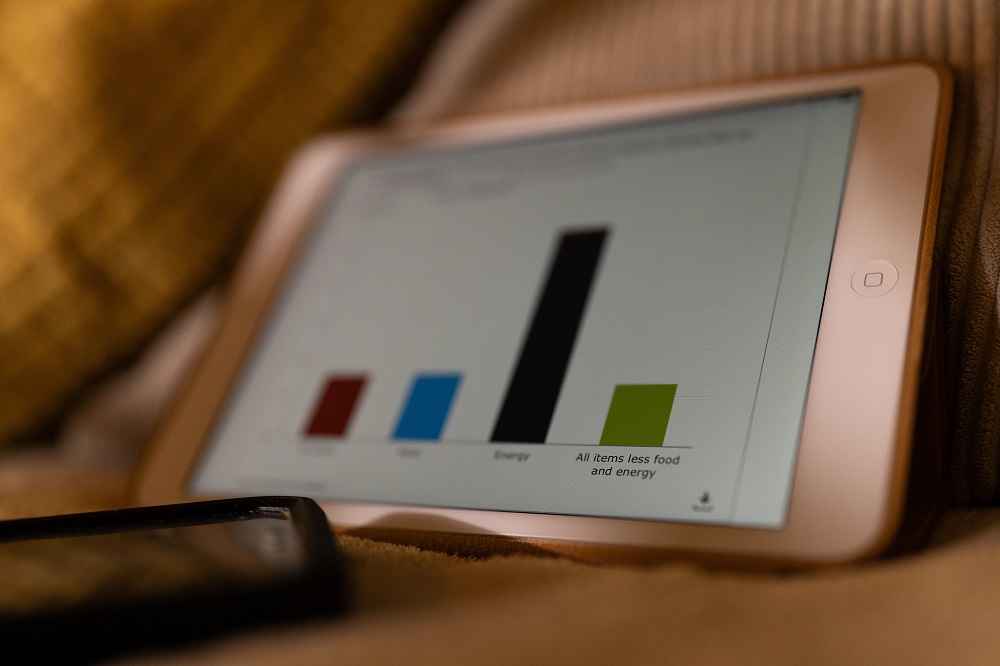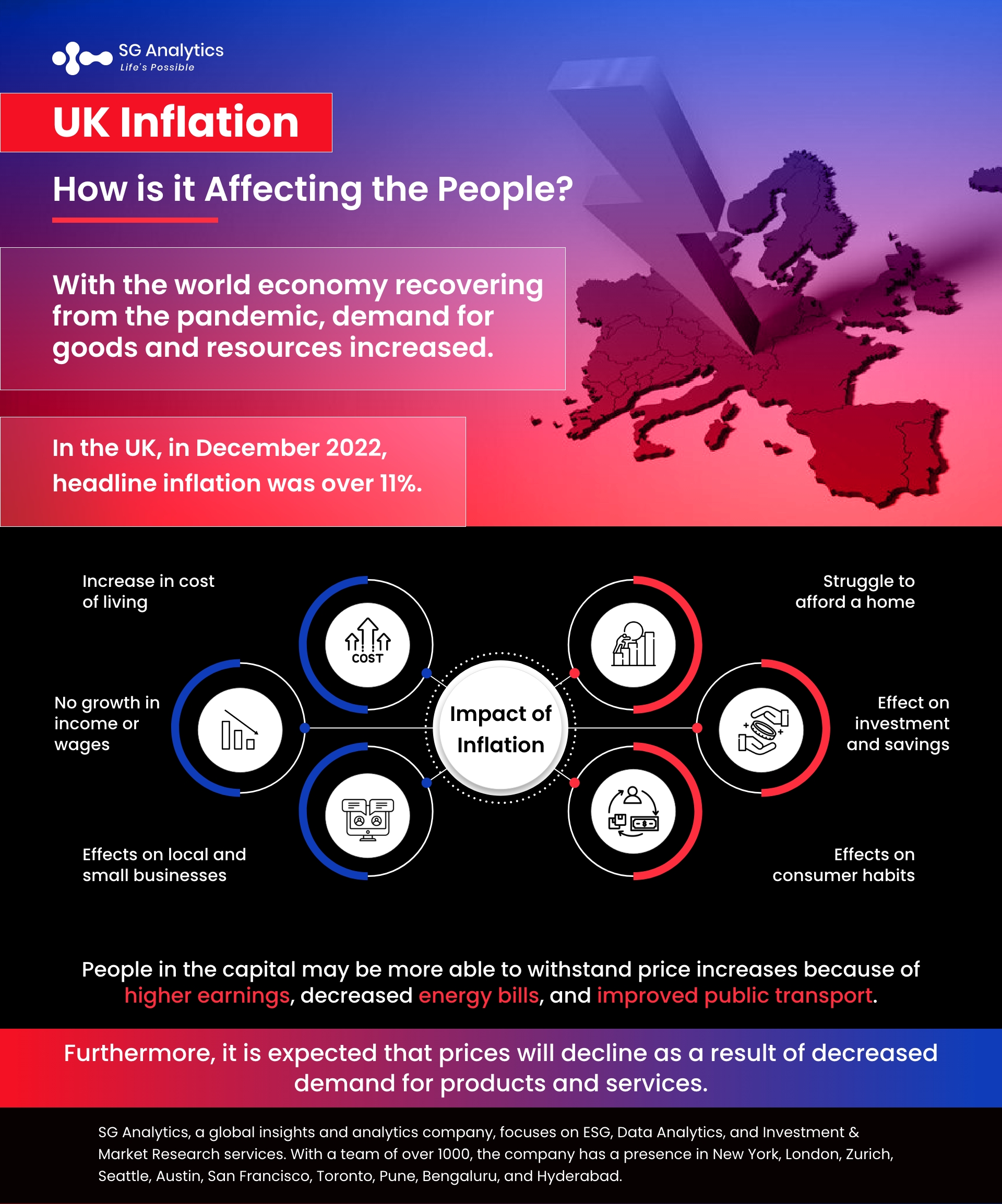Inflation amongst consumers increased in numerous nations throughout 2021 and '22. Shortages of essentials caused by the pandemic were a key contributor. With the world economy recovering from the pandemic, demand for goods and resources increased. Inflation worldwide was pushed higher by the conflict in Ukraine because of the rise in commodity prices, which occurred primarily in the first half of 2022.
Many economies' inflation rates appear to have peaked by late 2022, with annual inflation rates beginning to fall by early 2023. The UK's annual inflation rate of 10.1% in March 2023 was higher than that of some other economies.
In the UK, the year ending in October 2022 saw consumer price inflation at its highest pace in four decades. Many necessities, such as rental accommodation, food, and home energy, are increasing in price at a quicker rate than more luxury items, and this trend is mirrored in some regions of the UK.
In December 2022, headline inflation was over 11%. For many Londoners, this was the first time they could remember their real wages falling so quickly.

- The rising cost of living is likely to lower standards of living, raise poverty levels, and exacerbate health disparities. Prices for necessities like food and home energy are growing at a far faster rate than general inflation, which is affecting people of all income levels.
- Those with more disposable income will be able to weather the rising cost of living better than those with less, but many who were previously financially secure will be pushed into poverty.
Between February and March 2023, annual inflation dipped from 9.2 percent to 8.9 percent, which is still quite high in comparison to the average over the past few years.
Impact of Inflation
Increase in Cost of Living
London's cost of living has been on the rise along with inflation. Housing costs, such as rent and mortgage payments, have risen dramatically, making it harder for individuals and families to locate suitable lodgings at reasonable prices. In addition, people have seen significant price increases in their electricity bills, transportation expenditures, and basic essentials like groceries and healthcare.
No Growth in Income or Wages
Wages have not kept pace with rising living expenses for many London residents. Wages are less valuable due to inflation since the purchasing power of money decreases over time. Because of the increasing cost of living and the generally stable level of personal income, many people are finding themselves in difficult financial situations.

Effects on Local and Small Businesses
London's small businesses may feel the pinch of inflation. Their profit margins are being squeezed by rising rent, utility, and raw material expenses. Some small firms may not be able to afford the cost increases and may have to pass the cost on to customers by raising prices. This may lead to lower levels of consumer demand, which in turn threatens the long-term success of these businesses.
Struggle to Afford a Home
Rising home costs in London have made homeownership out of reach for many people. Rising property prices, a shortage of available homes, and a rise in mortgage interest rates have all made it difficult for first-time buyers and families to get into the market. Tenants' already precarious financial situation can worsen if inflation causes rental prices to rise.
Effect on Investment and Savings
The value of money saved and invested is diminished over time by inflation. Inflation eats away at the purchasing power of money over time, and traditional savings accounts and low-risk investment options may have trouble keeping up. It may become more challenging for individuals and families to save enough money for retirement or other long-term financial goals.

Effects on Consumer Habits
London shoppers may alter their habits significantly as a result of rising prices. People may become more careful and picky about where their money goes, putting more value on necessities and reducing spending on luxuries. As a result of this change in customer behaviour, repercussions may be felt in the retail, hospitality, and entertainment sectors.
How is the UK dealing with inflation?
The most recent numbers just released show that inflation in the UK remained high in March, falling only marginally but still remaining above 10% for the eighth time in the past nine months. To return the yearly pace of price increases to the 2% target, the government has so far largely relied on the Bank of England, which has clearly failed.
There are a few reasons to believe that inflation will fall rapidly this year.
-
First, wholesale energy prices have decreased significantly. This may not have yet affected your monthly expenses. However, this modification will aid in reducing inflation.
-
Second, a significant decline in the price of imported products is anticipated. This is due to the fact that some of the production difficulties encountered by businesses are beginning to ease.

-
In the United Kingdom, fewer people will have disposable income, resulting in less demand for goods and services.
-
All of this should indicate that prices for many items will not increase as rapidly as they have been.
There are indications that inflation has reached a turning point. Despite a decline in the middle of last year, it has been relatively stable since then. A sharp decline in inflation is expected in the near future. Hopefully, it will remain low if it falls.
Also, Read - Looming Fears of Inflation, The Fed, and Recession: Where are The Financial Markets Heading?
Conclusion
London's high cost of living is well-known. People in the capital may be more able to withstand price increases because of higher earnings, decreased energy bills, and improved public transport. The most recent price microdata shows that Londoners' household budgets are being severely strained.

Most goods and services will continue to increase in price, but the government is helping poor families by guaranteeing a cap on energy costs.
The Bank of England has raised interest rates in response to rising inflation. Raising interest rates makes it more costly to borrow money for things like loans and mortgages, which may lead to an increase in savings.
Furthermore, it is expected that prices will decline as a result of decreased demand for products and services. In an effort to boost sales, some stores may even lower the prices of commonly purchased items.
With a presence in New York, San Francisco, Austin, Seattle, Toronto, London, Zurich, Pune, and Hyderabad, SG Analytics, a pioneer in Research and Analytics, offers tailor-made services to enterprises worldwide.
A market leader in the BFSI space, SG Analytics assists businesses with insightful, relevant research along with sophisticated technology solutions. Contact us today if you are in search of a BFSI firm that helps in driving value-accretive decisions and executing efficient processes to enhance the efficacy of your investments.









